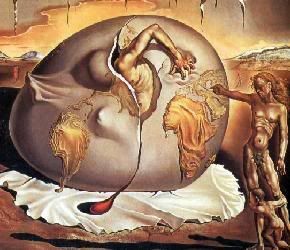
Kõver on ütlemata hea teema, mulle kohe hirmsasti meeldivad kõverad asjad. Seega on ka pilte kole palju. ;-)






























Your result for The Personality Defect Test...
You are 57% Rational, 57% Extroverted, 71% Brutal, and 86% Arrogant.

To put it less negatively:
1. You are more RATIONAL than intuitive.
2. You are more EXTROVERTED than introverted.
3. You are more BRUTAL than gentle.
4. You are more ARROGANT than humble.
Compatibility:
Your exact opposite is the Emo Kid.
Other personalities you would probably get along with are the Capitalist Pig, the Braggart, and the Sociopath.
*
*
If you scored near fifty percent for a certain trait (42%-58%), you could very well go either way. For example, someone with 42% Extroversion is slightly leaning towards being an introvert, but is close enough to being an extrovert to be classified that way as well. Below is a list of the other personality types so that you can determine which other possible categories you may fill if you scored near fifty percent for certain traits.
The other personality types:
The Emo Kid: Intuitive, Introverted, Gentle, Humble.
The Starving Artist: Intuitive, Introverted, Gentle, Arrogant.
The Bitch-Slap: Intuitive, Introverted, Brutal, Humble.
The Brute: Intuitive, Introverted, Brutal, Arrogant.
The Hippie: Intuitive, Extroverted, Gentle, Humble.
The Televangelist: Intuitive, Extroverted, Gentle, Arrogant.
The Schoolyard Bully: Intuitive, Extroverted, Brutal, Humble.
The Class Clown: Intuitive, Extroverted, Brutal, Arrogant.
The Robot: Rational, Introverted, Gentle, Humble.
The Haughty Intellectual: Rational, Introverted, Gentle, Arrogant.
The Spiteful Loner: Rational, Introverted, Brutal, Humble.
The Sociopath: Rational, Introverted, Brutal, Arrogant.
The Hand-Raiser: Rational, Extroverted, Gentle, Humble.
The Braggart: Rational, Extroverted, Gentle, Arrogant.
The Capitalist Pig: Rational, Extroverted, Brutal, Humble.
The Smartass: Rational, Extroverted, Brutal, Arrogant.
Be sure to take my Sublime Philosophical Crap Test if you are interested in taking a slightly more intellectual test that has just as many insane ramblings as this one does!
About Saint_Gasoline
I am a self-proclaimed pseudo-intellectual who loves dashes. I enjoy science, philosophy, and fart jokes and water balloons, not necessarily in that order. I spend 95% of my time online, and the other 5% of my time in the bathroom, longing to get back on the computer. If, God forbid, you somehow find me amusing instead of crass and annoying, be sure to check out my blog and my webcomic at SaintGasoline.com.
Take The Personality Defect Test at HelloQuizzy
Your result for The Sublime Philosophical Crap Test...
You scored 100% Non-Reductionism, 44% Epistemological Absolutism, and 22% Moral Objectivism!


Metaphysics: Non-Reductionism (Idealism or Realism)
In metaphysics, my test measures your tendency towards Reductionism or Non-Reductionism. As a Non-Reductionist, you recognize that reality is not necessarily simple or unified, and you thus tend to produce a robust ontology instead of carelessly shaving away hypothetical entities that reflect our philosophical experiences. My test recognizes two types of Non-Reductionists: Idealists and Realists.
1. Idealists believe that reality is fundamentally unknowable. All we can ever know is the world of sense experience, thought, and other phenomena which are only distorted reflections of an ultimate (or noumenal) reality. Kant, one of the most significant philosophers in history, theorized that human beings perceive reality in such a way that they impose their own mental frameworks and categories upon reality, fully distorting it. Reality for Kant is unconceptualized and not subject to any of the categories our minds apply to it. Idealists are non-reductionists because they recognize that the distinction between phenomenal reality and ultimate reality cannot be so easily discarded or unified into a single reality. They are separate and distinct, and there is no reason to suppose the one mirrors the other. Major philosophical idealists include Kant and Fichte.
If your views are different from the above, then you may be a Realist.
2. Realists deny the validity of sloppy metaphysical reductions, because they feel that there is no reason to suspect that reality reflects principles of parsimony or simplicity. Realism is the most common-sensical of the metaphysical views. It doesn't see reality as a unity or as reducible to matter or mind, nor does it see reality as divided into a phenomenal world of experience and an unknowable noumenal world of things-in-themselves. Realist metaphysics emphasizes that reality is for the most part composed of the things we observe and think. On the question of the existence of universals, for instance, a realist will assert that while universals do not physically exist, the relations they describe in particulars are as real as the particular things themselves, giving universals a type of reality. Thus, no reduction is made. On the mind-body problem, realists tend to believe that minds and bodies both exist, and the philosophical problems involved in reducing mind to matter or matter to mind are too great to warrant such a reduction. Finally, realists deny that reality is ultimately a Unity or Absolute, though they recognize that reality can be viewed as a Unity when we consider the real relations between the parts as constituting this unity--but it doesn't mean that the world isn't also made up of particular things. Aristotle and Popper are famous realists.
*****

Epistemology: Skepticism (Idealism or Subjectivism)
In regards to epistemology, my test measures your tendency towards Absolutism or Skepticism. As an epistemological Skeptic, you believe that ultimate reality cannot be known in any objective way. The two categories of Skeptics that my test recognizes are Idealists and Subjectivists.
1. Epistemological Idealists believe that knowledge of ultimate reality is impossible. All we can ever have knowledge about is the world of phenomenal human experience, but there is no reason to suspect that reality mirrors our perceptions and thoughts, according to Idealists. Idealists, then, tend to see truth not as a correspondence between propositions and reality--reality is, after all, fundamentally unknowable--but as a coherence between a whole system of propositions taken to be true. We cannot escape from language or our conceptualized world of phenomena, so we are unable to reference propositions to facts and must instead determine their truth by comparing them to other propositions we hold to be true. As a result of such an idealism, knowledge of any ultimate reality is taken to be impossible, hence the Skeptical tendency of idealism. All our pursuits of knowledge, science included, can only reflect a phenomenal reality that is of our own making. Famous idealists include Kant and Fichte.
If the above did not sound skeptical or idealistic enough to reflect your own views, then you are most likely a Subjectivist.
2. Epistemological Subjectivists, like idealists, believe that all our knowledge is ultimately of our own making because it is filtered through our subjective perceptions. Unlike an idealist, though, a subjectivist doesn't believe in any universal categories of "truth" that apply to the phenomenal world, because each individual can create his own truth. Either that, or he will hold that society or custom creates its own forms of truth. A subjectivist will tend to regard scientific inquiry as a game of sorts--science does not reveal truths about reality, but only gives scientists pseudo-solutions to pseudo-problems of the scientific community's own devising. It is a type of puzzle-solving, but the puzzle isn't of reality. The definition of truth to a subjectivist may be one that recognizes a proposition's usefulness to an individual. William James is one such subjectivist, who believes that we can "will to believe" certain propositions so long as we would find them useful. The example he gives is being found in a situation where you must leap over a chasm in order to survive. The true belief, in such a situation, is that the leap will be successful--this truth is certainly more useful to us, and in believing the truth we become more willing to commit to the jump and make it successful. So, in essence, knowledge of reality is possible for a subjectivist because they never make reference to any objective reality existing outside of our own perceptions and beliefs--we can have knowledge of reality through having knowledge of ourselves, and that is all that we should ask for. Famous subjectivists include Kuhn, Feyarabend, and James. Another famed critic of Absolutism is Hume.
*****

Ethics: Relativism (Subjectivism or Emotivism)
My test measures one's tendency towards moral Objectivism or moral Relativism in regards to ethics. As a moral Relativist, you tend to see moral choices as describing a subject's reaction to a moral object or situation, and not as a property of the moral object itself. You may also feel that moral words are meaningless because they do not address any empirical fact about the world. My test recognizes two types of moral relativists--Subjectivists and Emotivists.
1. Subjectivists see individual or collective desires as defining a situation's or object's moral worth. Thus, the subject, not the object itself, determines the value. Subjectivists recognize that social rules, customs, and morality have been wide-ranging and quite varied throughout history among various cultures. As a result, Subjectivism doesn't attempt to issue hard and fast rules for judging the moral worth of things. Instead, it recognizes that what we consider "good" and "right" is not bound by any discernable rule. There is no one trait that makes an act good or right, because so many different kinds of things have been called good and right. In regards to the definition of "good" or "right", a Subjectivist will tend to define it as whatever a particular person or group of people desire. They do not define it merely as "happiness" or "pleasure", for instance, because sometimes we desire to do things that do not produce pleasure, and because we don't consider all pleasurable things good. Furthermore, Subjectivists recognize the validity of consequentialism in that sometimes we refer to consequences as good and bad--but they also recognize that our intentions behind an action, or the means to the end, can also determine an act's moral worth. Again, there is no one rule to determine these things. Hence the relativism of moral Subjectivism. The most well-known of the subjectivists is Nietzsche.
If that didn't sound like your position, then you are probably the other variety of moral Relativist--the Emotivist.
Emotivists are moral Relativists only in a very slanted sense, because they actually deny that words about morality have any meaning at all. An Emotivist would probably accept Hume's argument that it is impossible to derive an "ought" from an "is"--no factual state of affairs can logically entail any sort of moral action. Furthermore, a emotivist's emphasis on scientific (and hence empirical) verification and testing quickly leads to the conclusion that concepts such as "good" and "right" don't really describe any real qualities or relations. Science is never concerned with whether a particular state of affairs is moral or right or good--and an emotivist feels much the same way. Morality is thus neither objective or subjective for the emotivist--it is without any meaning at all, a sort of vague ontological fiction that is merely a symbol for our emotional responses to certain events. Famous emotivists include Ayer and other positivists associated with the Vienna Circle.
*****
As you can see, when your philosophical position is narrowed down there are so many potential categories that an OKCupid test cannot account for them all. But, taken as very broad categories or philosophical styles, you are best characterized as an N-S-R. Your exact philosophical opposite would be an R-A-O.
About the Author
Saint_gasoline is a crazed madman who spends all of his time writing OKCupid tests and ranting about philosophy and science. If you are interested in reading more of his insane ramblings, or seeing his deliciously trite webcomic, go to SaintGasoline.com.






The Internet's Original Travel Blog.